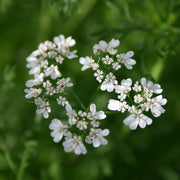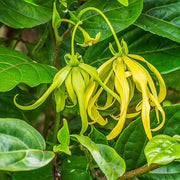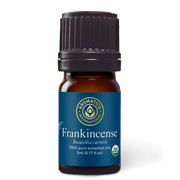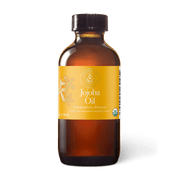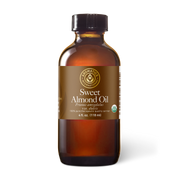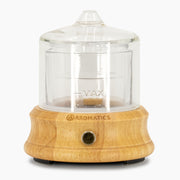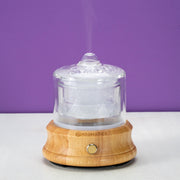When it comes to maintaining good health and well-being, relaxation is essential. Stress can have a major impact on our physical and mental wellbeing, from increasing the risk of developing high blood pressure to triggering depression or anxiety. For those looking for natural ways to reduce stress and improve their overall wellness, coriander oil offers some beneficial relief.
Coriander essential oil, also known as coriander seed essential oil, is steam distilled from the aromatic seeds of the Coriandrum sativum plant. The leaves of the plant are referred to as cilantro (the popular culinary herb), while the seeds are referred to as coriander. What a unique plant! This botanical has long been used in traditional medicine and Ayurvedic practices for its anti-inflammatory, digestive and relaxing properties. Today, research suggests that coriander may be a powerful ally in reducing stress, anxiety and improving relaxation.

In this post, we’ll explore the potential health benefits of coriander for relaxation and stress relief. We’ll discuss the role of linalool in these therapeutic benefits and provide practical tips for incorporating coriander essential oil into your relaxation routine. Read on to learn more about how coriander essential oil can help you relax and unwind.
The Relaxing Properties of Coriander Essential Oil
Coriander essential oil is a unique oil known for its relaxing properties that can help soothe the mind and body. When inhaled or applied topically, coriander oil can provide a sense of tranquility and peace, making it an ideal choice for reducing stress and anxiety.
One of the most popular ways to use coriander for relaxation is through aromatherapy. By diffusing the oil in a room, the soothing aroma can help promote a sense of calm and relaxation. Coriander can also be added to a warm bath to help ease tension and promote relaxation.
In addition, coriander can be used in massage therapy to help soothe sore muscles and promote relaxation. When combined with a carrier oil like jojoba or sweet almond oil, coriander can be used to create a relaxing body massage oil blend that can be applied topically to the skin.
Overall, the relaxing properties of coriander make it a versatile and effective natural remedy for reducing stress and promoting relaxation in the mind and body.
The Role of Linalool in Coriander Essential Oil

Coriander essential oil's chemical composition contributes to its therapeutic properties, with linalool being the most prominent component. Linalool is also the top chemical component found in lavender essential oil, which is widely known for its calming and relaxing effects.
Research suggests that linalool can help improve health by reducing stress and anxiety by interacting with the brain's GABA receptors, which are responsible for regulating the body's response to stress. It can also help lower heart rate and blood pressure, further contributing to its soothing effects on the body and mind.
While both coriander and lavender essential oils contain linalool, coriander oil actually contains a higher percentage of this soothing component. It also has a more grounding effect than lavender, making it an ideal choice for those looking for a natural remedy to help ease feelings of nervousness or tension.
Linalool plays a crucial role in coriander essential oil's ability to help reduce stress, anxiety, and nervous tension, making it an excellent addition to any relaxation routine.
Pro Tip: While both coriander and lavender essential oils contain linalool, they each contain a different linalool enantiomer. Coriander is more grounding with a sweet, citrus, and spicy aroma while lavender is more woody and floral.
Want to learn more about essential oil chemistry? Click here to take your understanding to the next level!
What Does It Smell Like?
Coriander oil is known as a fresh, sweet, and slightly spicy oil. Its warm and inviting aroma is often described as having subtle notes of citrus and herbs. Additionally, its pleasant aroma makes it a popular ingredient in natural perfumes and all-natural fragrance blends.
How to Use Coriander Essential Oil for Relaxation

Now that we know about the relaxing benefits of coriander essential oil and the role of linalool, let's explore some practical ways to incorporate this oil into your relaxation routine. Here are a few tips:
1. Diffuse in your home: Drop coriander essential oil in your diffuser and let it fill your home with its relaxing aroma.
2. Add to your bath: Mix a few drops of coriander essential oil with a carrier oil or bath salts and add it to your bathwater for a relaxing soak.
3. Use in a massage oil blend: Mix coriander essential oil with a carrier oil like jojoba or sweet almond oil and use it in a massage to help reduce stress and tension.
4. Blended in a nighttime oil: Coriander oil can be mixed with Ghandi root oil and sandalwood essential oils in a base of jojoba to create a nighttime oil to promote relaxation and restful sleep.
Coriander Essential Oil DIY Recipes:
Safety Information & Shelf Life

Coriander's gentle nature means it has no known safety issues, and is generally safe for children. However, it's important to remember that essential oils are highly concentrated and should be diluted properly before use. Always follow safety guidelines and perform a small patch test before using a new essential oil. New to diluting essential oils? Check out this article to get all the details.
Coriander essential oil can last for roughly 4 years when stored properly in a cool, dark place, away from sunlight and heat sources. It is important to keep the bottle tightly sealed to prevent oxidation and contamination. Learn more about how to store your essential oils to keep them fresh as long as possible in this helpful video.
More Top Benefits of Coriander Essential Oil
Coriander essential oil has been shown to possess numerous health benefits beyond its potential for reducing stress and anxiety. Its anti-inflammatory properties make it effective for pain relief and inflammation, while its antioxidant properties can help protect against cellular damage. Additionally, it has been used for centuries to aid digestion and may help alleviate digestive issues such as bloating and nausea. Coriander oil also has antimicrobial properties that can help fight off harmful bacteria and fungi, making it useful for skin care and wound healing.
Other Oils that Pair Nicely with Coriander Oil
While coriander essential oil can be a powerful tool for relaxation and stress relief on its own, it can also be combined with additional essential oils to create even more potent blends. Here are a few essential oils that pair nicely with coriander:
1. Lavender Oil (Lavandula angustifolia): Known for its relaxing benefits, lavender oil blends well with coriander oil to create a soothing and stress-relieving blend.
2. Bergamot Oil (Citrus bergamia): With its uplifting and mood-boosting properties, bergamot oil pairs well with coriander to create a blend that can help ease anxiety and promote relaxation.
3. Ylang Ylang (Complete) Oil (Cananga odorata var. Genuina): Known for its floral and exotic scent, ylang ylang oil is often used for its mood-enhancing properties. When combined with coriander oil, it can create a relaxing and sensual blend.
4. Geranium Oil (Pelargonium graveolens var roseum): With its balancing and uplifting properties, geranium oil is a great companion for coriander. Together, they can create a relaxing and grounding blend.
5. Frankincense Oil (Boswellia carterii): Known for its centering properties, frankincense oil is often used to promote relaxation and reduce stress. When combined with coriander, it can create a soothing and grounding blend that promotes feelings of peace and tranquility.
Try Coriander Essential Oil Today
Coriander essential oil is a powerful tool for relaxation and stress relief due to its natural properties and high concentration of linalool. By incorporating coriander into your daily routine through methods such as aromatherapy, massage, or as part of a nighttime oil, you can experience the benefits of reduced stress and anxiety, while boosting your overall health and wellness. We encourage you to give coriander essential oil a try and discover its relaxing effects for yourself.
Additional Learning Resources
For a deeper understanding of how you can use essential oils for anxiety be sure to check out our free learning guide, "Natural Stress Management with Essential Oils". Also, be sure to read our other blog, "Unwind Naturally with 10 Essential Oils for Anxiety".







